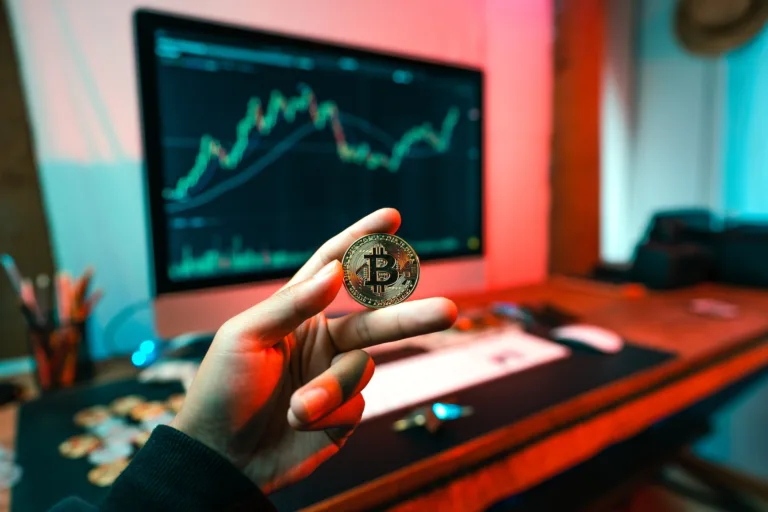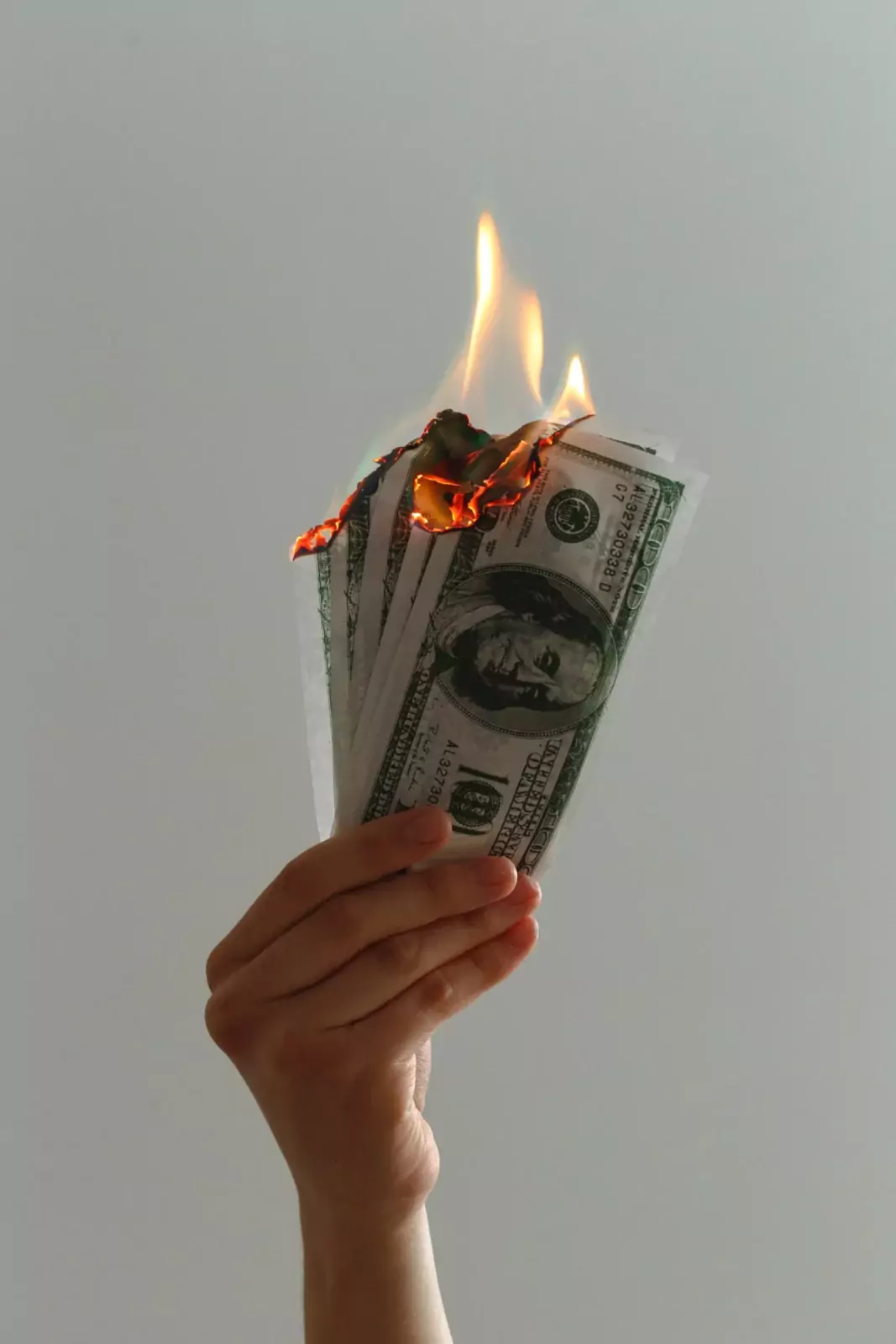How did money (as we know it) first start?
When and why did people start using it?
These are some questions that come up when we discuss money history.
Let’s begin.
What you'll learn:
⓵ What is money?
❖ Definition of money
Money is nothing more than a medium of exchange. And we (humans) trade it for goods or services. It is a universal measure of value that we recognize and accept all over the world.
But how did it all begin?
❖ Money history and its evolution
The history of money is a long and varied one. It originated in ancient societies. Where people used commodities such as shells, beads, and livestock as a means of exchange (called bartering).
Over time, standardized forms of money (such as coins and paper currency) replaced these commodities. But what is bartering (you may ask)?

❖ What’s bartering?
Bartering is the exchange of goods or services for other goods or services, without the use of money. Here are a few examples of bartering:
- A farmer exchanges a basket of apples for a gallon of milk from a dairy farmer
- A web designer exchanges his or her services for accounting services from a bookkeeper
- A plumber exchanges plumbing services for a haircut from a barber
- A carpenter exchanges a handmade wooden table for a month’s worth of groceries from a local grocery store
- A dentist exchanges teeth cleaning services for legal advice from a lawyer
- And so forth
In all the above examples, everyone gets something they need (or want). Without having to use money. Bartering was a useful way to get goods (and services) that you couldn’t afford with money. Or to get rid of goods that you no longer needed. One man’s trash is another man’s treasure, right?
Countries can exchange goods or services in a large scale too with bartering (known as International Barter or Counter Trade).
❖ Different forms of money (physical, digital)
There are several forms of money that we use in the world today (more on this later on). Physical currency (such as coins and paper bills) is the most common form of money.
Digital currency (also known as crypto) is another form of money that we started using a lot more recently (Bitcoin was first introduced back in 2009). Other forms of money include checks, credit and debit cards, and electronic transfers.
❖ Importance of money in modern society
In our modern society, money plays a vital role in our daily lives. We buy the things we need and want. We pay for services. And we save and invest for the future. Money is also a source of power and influence.
Those who have more of it, often have greater control and access to opportunities (this is why it’s our duty to earn more).
Regardless of the form it takes, money is a crucial part of our economic system. And the way we live our lives. It is important to understand its value and how to use it responsibly (if financial stability/success is our goal).
⓶ What are the functions of money?
❖ Medium of exchange
As we’ve already seen, money is as a medium of exchange that people use to make a trade. Without a medium of exchange, people would have to barter directly for goods and services. Which can be inefficient and difficult.
Money allows people to easily exchange goods and services. Without having to worry about finding someone who has exactly what they want (and is willing to trade it for something they have of course).
❖ Unit of account
Another important function of money is as a unit of account. This simply means that money can be the standard measure of the value of goods and services. This allows people to compare the value of different items. And make decisions about what to buy based on their relative value.
For example, if you know that a bag of apples costs $5. And a gallon of milk costs $3. You can easily compare the value of these two items. And decide which one is a better deal for you.

❖ Store of value
Money also serves as a store of value. In other words, you can save it and use it at a later time (when the need arises). This is important because it allows people to save money for future expenses. Or to use it for emergencies.
For example, if you have $500 saved in the bank. You can use that money to pay for unexpected expenses. Or to invest in something that will generate a return in the future.
All in all, money has three main functions. As a medium of exchange, a unit of account, and a store of value. These functions make it an essential part of our modern society. And allow people to easily trade goods and services. Compare the value of different items. And save for the future.
⓷ What are the types of money?
❖ Commodity money (gold, silver)
Commodity money is (as the name implies) based on a commodity that has intrinsic value. Yes, just like gold and silver. The commodity has value in and of itself separate from its use as money (that the market determines).
❖ Fiat money (printed by the government)
Fiat money is not backed by any physical commodity. But is instead backed by the government that issues it. This means that the value of fiat money is not determined by the value of a physical commodity. But rather by the faith and credit of the issuing government.
For example, the value of the US dollar is determined by the faith and credit of the US government. Not by the value of any physical commodity (after 1971 when president Nixon abandoned the gold standard).
❖ Cryptocurrency (Bitcoin, Ethereum)
Crypto is a digital (or virtual) currency that uses cryptography for security. And is not backed by a central authority (such as a government). Cryptocurrencies are decentralized systems that allow for the creation and transfer of digital tokens. Which are often based on blockchain technology.
Some examples of cryptocurrencies include Bitcoin, Ethereum, and Litecoin. The value of cryptocurrencies is determined by supply and demand on cryptocurrency exchanges.
These are considered extremely volatile and hence can’t be used as a store of value. However, there are now digital coins like USDT (known as stable coins) that are trading close to $1 USD at all times. So people and businesses can use these (with relatively low fees) to transact and trade.

In short, there are three main types of money (commodity, fiat, and crypto). Commodity money is based on a physical commodity such as gold or silver. The market value of the commodity determines its value.
Goverments issue fiat money. And its value is determined by the faith and credit of the issuing government. Crypto is a digital currency that isn’t backed by a central authority (and supply and demand on crypto exchanges determines its value).
So, what does the future hold for money and where do we go next?
⓸ What is the future of money?
❖ Will cash die out?
As technology continues to advance. And our society becomes increasingly digital. It’s likely that the use of traditional physical currency will decline.
Many experts predict that we are heading towards a cashless society (I personally stopped using cash years ago). Where electronic forms of payment (such as debit and credit cards, mobile payment apps, and digital currencies like Bitcoin) will dominate.
Isn’t this happening already? Duh.
❖. Better economic activity?
One of the main advantages of a cashless society is increased convenience. Instead of carrying around physical cash or checks (people still use checks? 😀).
Individuals can easily make payments and transfer money using their smartphones. This can also make it easier to track and manage finances, as all transactions are recorded electronically.
❖ Potential challenges
However, there are tax evasion concerns associated with crypto. Also, there are some who hesitate to rely on electronic forms of payment. Because of security concerns or a lack of access to technology.
There is also the issue of financial inclusion. As certain groups (like the elderly or those in developing countries) may not have access to the necessary infrastructure or devices to participate in a cashless society.
In addition to the shift towards digital forms of payment, there is also the potential for the emergence of new forms of money and currency.
For example, some people believe that crypto has the potential to revolutionize the way we think about money. While still in its early stages, crypto has the potential to disrupt traditional financial systems. And create new opportunities for investment and wealth creation.
Overall, the future of money is likely to be shaped by technological advancements. And changing societal attitudes towards traditional forms of currency. It’s important to stay informed and adapt to these changes. So that we can make informed financial decisions and plan for the future.
⓹ Popular money FAQ
Here are the 12 most common questions and answers about the history of money that people may have:
❖ When was money first used?
The use of money can be traced back to ancient civilizations, such as the Mesopotamians and the Chinese. They used forms of money like metal coins and cowry shells around 3,000 BCE.
❖ How has the form of money changed over time?
The form of money has changed significantly over time. In ancient civilizations, people used cowry shells, metal coins, and other physical objects as money. Later on, they introduced paper money and banknotes. And eventually started using digital forms of money such as electronic transfers and crypto.
❖ How did the gold standard impact the global economy?
The gold standard was a system in which a country’s currency was connected to the value of gold. Meaning that a government would promise to redeem a specific amount of paper money for a certain amount of gold. It impacted the global economy by creating a stable currency system.
But the value of the currency would reflect the gold market. If gold became scarce, money became scarce too. This could lead to economic instability and high inflation. However, many are in favor of the gold standard over the ability for governments to print money out of thin air.
❖ What was the role of gold and silver in ancient economies?
Gold and silver played a significant role in ancient economies. As they were considered valuable and were often used as a form of currency. Many ancient civilizations used gold and silver coins as a medium of exchange and as a store of value.
❖ What is the history of central banking?
Central banking has a long history. With the earliest examples dating back to ancient civilizations such as the Mesopotamians and the Chinese. The modern concept of central banking, however, emerged in the 17th century in Sweden. With the creation of the Sveriges Riksbank, which is considered to be the first central bank.
Over time, central banking systems have evolved and expanded in scope. With the creation of national central banks and the establishment of the Federal Reserve System in the United States in 1913.
❖ How has the use of money evolved over time?
The use of money has evolved significantly over time. From the use of precious metals and other physical objects in ancient civilizations to the use of paper money and banknotes, to the use of digital forms of money (electronic transfers and crypto) in modern times. Additionally, the functions of money have expanded to a medium of exchange, a store of value, and a unit of account.
❖ What was the role of banks in the development of money?
Banks played a crucial role in the development of money. They have traditionally served as intermediaries between savers and borrowers. And by accepting deposits and making loans they have facilitated the circulation of money. Additionally, they played a key role in the creation of credit (money that is created by the banking system through the process of lending).
❖ What’s money?
Money is a medium of exchange that is used to facilitate transactions for goods and services. It is a standard unit of value that can be exchanged for goods and services, and is often used as a store of value.
❖ What are the different forms of money?
There are several different forms of money, including physical forms such as coins and bills, and digital forms such as electronic bank transfers and digital currencies.
❖ What’s inflation?
Inflation is the rate at which the general level of prices for goods and services is rising. And, as a result, our purchasing power is falling. Central banks attempt to limit inflation and avoid deflation in order to keep the economy running smoothly by increasing (or lowering) interest rates.
❖ What’s a budget?
A budget is a financial plan that outlines how you will allocate your income and expenses over a period of time (a month or a year usually). It helps you to manage your money and make sure that you are saving and spending wisely to reach your goals.
❖ What’s a credit score?
A credit score is a numerical representation of your creditworthiness (based on your credit history). Lenders (banks) use it to determine your risk level when you apply for a loan or credit card. A higher credit score may result in a better interest rate or credit limit.
⓺ Top 19 money quotes and their meaning
All these are subjective but here is my own interpretation.
“Money can’t buy happiness, but it can buy you the kind of misery you prefer.”
— Spike Milligan
Money may not bring true happiness, but it can give you the means to purchase material possessions or experiences that may bring temporary enjoyment or satisfaction.
“The love of money is the root of all evil.”
— 1 Timothy 6:10
The pursuit of wealth and material possessions can lead to immoral or unethical behavior.
“Formal education will make you a living; self-education will make you a fortune.”
— Jim Rohn
While formal education can provide you with the skills and knowledge to earn a living, continuous learning and self-education can lead to greater success and wealth.
“The best investment you can make is in yourself.”
— Warren Buffett
Investing in your own education, skills, and personal growth can lead to greater opportunities and success in the long term.
“The hardest thing in the world to understand is income tax.”
— Albert Einstein
Taxes can be complex and difficult to understand, especially for those who are not familiar with the laws and regulations governing them.
“The safest way to double your money is to fold it over once and put it in your pocket.”
— Kin Hubbard
This quote suggests that it is safer to save and be cautious with your money, rather than risk it all in an attempt to double it.
“The biggest risk is not taking any risk. In a world that’s changing quickly, the only strategy that is guaranteed to fail is not taking risks.”
— Mark Zuckerberg
In a rapidly changing world, taking calculated risks can lead to greater opportunities and success. Failing to take any risks may result in missed opportunities.
“The love of money is natural, but the love of money as the sole aim in life is not.”
— Socrates
While it is natural to desire wealth and financial security, making it the sole focus of one’s life can be detrimental to one’s overall well-being and happiness.
“Money is only a tool. It will take you wherever you wish, but it will not replace you as the driver.”
— Ayn Rand
Money can provide resources and opportunities, but it is ultimately up to the individual to take advantage of them and make the most of their potential.
“Money is like a sixth sense without which you cannot make a complete use of the other five.”
— W. Somerset Maugham
Money can provide resources and opportunities that can enhance one’s ability to use their other senses and abilities to the fullest.
“Money is a poor man’s credit card.”
— Marshall McLuhan
My interpretation is that money can serve as a substitute for credit, allowing individuals to make purchases and obtain goods and services without the need for credit.
“Money is the most egalitarian force in society. It confers power on whoever holds it.”
— Roger Starr
It has the ability to give individuals a certain level of power and influence, regardless of their social or economic status.
“The more money you have, the less you feel the need to hoard it.”
— Muhammad Yunus
Individuals who have a significant amount of wealth may feel less of a need to hold onto it tightly and may be more willing to spend it, invest it, or give it away.
“I’d like to live as a poor man with lots of money.”
— Pablo Picasso
This quote suggests that the individual does not want money to be the driving force in their life, but rather wants to be able to use it to live a comfortable and fulfilling life.
“The rich invest in time, the poor invest in money.”
— Warren Buffett
Wealthy individuals often invest in activities that generate passive income or create value over the long term, while those who are not as financially well-off may focus on earning a higher income in the short term.
Final thoughts
The concept of money has been around for centuries. And has undergone numerous changes throughout its history. At its most basic level, money is a medium of exchange that allows people to trade goods and services. It serves as a unit of account, providing a common measure of value for goods and services. And also functions as a store of value (allowing people to save and invest for the future).
Throughout history, various forms of money have been used. From commodity (gold) and fiat (printed by governments) to crypto (Bitcoin). After covid, there has been a rapid rise in the use of digital forms of currency. I personally believe this was gonna happen anyway. But covid just expedited things. And this is a good thing. You can sign documents online, change your bank details, order food, pay for services, and much more — all from the comfort of your phone.
As society continues to evolve, it’s likely that the use of money will change as well. Some experts predict that there will be an increasing reliance on digital currency in the future. Potentially leading to a cashless society.

This shift could bring about new challenges and opportunities for both individuals and society as a whole.
It is important for people to have a strong understanding of the nature and functions of money. As it plays a central role in personal and societal contexts. By understanding the different forms of money, their uses, and their potential future developments, individuals can make informed decisions about how to manage their own finances. And plan for their financial future.



